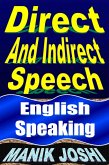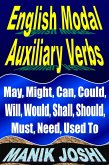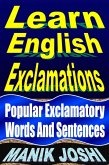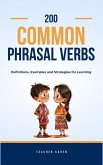Verb 'To Be'
Verb 'To Be' -- Negative Patterns
Verb 'To Be' -- Interrogative Patterns
1A. English Grammar 'Am'
1B. AM + -ING Form of Verb
1C. AM + Being + Past Participle
1D. AM + Past Participle
2A. English Grammar 'Is'
2B. IS + -ING Form of Verb
2C. IS + Being + Past Participle
2D. IS + Past Participle
3A. English Grammar 'Are'
3B. ARE + -ING Form of Verb
3C. ARE + Being + Past Participle
3D. ARE + Past Participle
4A. English Grammar 'Was'
4B. WAS + -ING Form of Verb
4C. WAS + Being + Past Participle
4D. WAS + Past Participle
5A. English Grammar 'Were'
5B. WERE + -ING Form of Verb
5C. WERE + Being + Past Participle
5D. WERE + Past Participle
Useful Notes
(1): Question Tags
(2): Short Answers (Ellipsis]
(3): Addition to Remarks
(4): There Is/Was and There Are/Were
(5): Subjunctive Mood 'Were'
(6): Be + Going To + Verb Word
(7): 'Used to' Vs. 'Be + Used to'
(8): Be + To + Verb Word
(9): Be + 'Being"+ Adjective
(10): Mixed Sentences
Exercises: 1(A) and 1(B)
Exercises: 2(A) to 2(E)
Sample This:
Verb 'To Be'
The Verb 'to be' is used to represent the following English verbs:
'Am', 'Is', 'Are', 'Was', 'Were'
The verb 'to be' is used as both a linking verb and an auxiliary verb.
LINKING VERB:
A verb that connects a subject with the complement (adjective or noun) that describes it.
Example: He is an engineer. [In this sentence, the subject (he) and noun (engineer) are connected by linking verb 'is'. There is no main verb in this sentence.]
Some more examples:
I am happy. [linking verb am]
Is he a good boy? [linking verb is]
We are very proud of ourselves. [linking verb are]
She was intelligent. [linking verb was]
They were not late by half an hour. [linking verb were]
AUXILIARY VERB:
A verb that is used with the main verb to show tenses, etc.
Example: He is going to the office. [In this sentence, -ing form of the main verb 'go' has been used with the auxiliary verb 'is'.
Some more examples:
I am studying a book. [auxiliary verb am main verb study (-ing form)]
He is working on his project [auxiliary verb is main verb work (-ing form)]
We are not expected to tell the secret. [auxiliary verb are main verb expect (past participle form)]
She was taught by me. [auxiliary verb was main verb teach (past participle form)]
Were they burdened by high taxation [auxiliary verb were main verb burden (past participle form)]
IMPORTANT POINTS ABOUT THE VERB 'TO BE'
'AM'
Singular Verb
Used In Present Tense
Used with Subject 'I'
'IS'
Singular Verb
Used In Present Tense
Used with Subject 'He' 'She', 'It' and other Singular Subjects
'ARE'
Plural Verb
Used In Present Tense
Used with Subject 'We', 'You', 'They' and other Plural Subjects
'WAS'
Singular Verb
Used In Past Tense
Used with Subject 'I', 'He', She', 'It' and other Singular Subjects
'WERE'
Plural Verb
Used In Past Tense
Used with Subject 'We', 'You' and other Plural Subjects
Dieser Download kann aus rechtlichen Gründen nur mit Rechnungsadresse in A, B, CY, CZ, D, DK, EW, E, FIN, F, GR, H, IRL, I, LT, L, LR, M, NL, PL, P, R, S, SLO, SK ausgeliefert werden.









